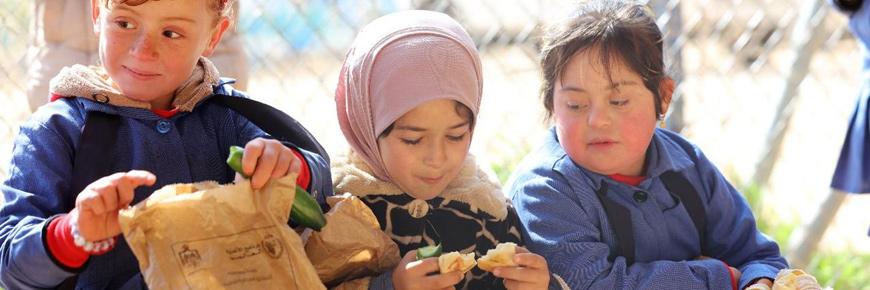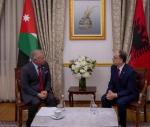You are here
Productive kitchen offers jobs to Madaba women, meals to schoolchildren
By Lara Darwazah - Sep 18,2016 - Last updated at Sep 20,2016

Women prepare meals at Al Aqsa Productive Kitchen recently to be distributed to schoolchildren (Photo courtesy of WFP/Lara Darwazah)
MADABA — A WFP project to provide meals for children of underprivileged families at schools in Jordan has also become a source of employment for women in local communities.
In Madaba, 30km southwest of Amman, Al Aqsa Productive Kitchen employs specially trained local women to prepare the meals for the WFP’s “Healthy Kitchen School Meals” programme, a pilot project that was launched in 2015 in collaboration with the Royal Health Awareness Society and the Ministry of Education.
Mother-of-five Um Talal manages day-to-day work at the kitchen.
“I arrive at 5:30 in the morning, I need to check on the baker early in order to avoid any mishaps with the preparation of food, and we shut down the kitchen at 4 o’clock in the afternoon,” she said.
A self-taught chef, Um Talal learnt the skill by watching her mother cook.
A team of 13 women prepare and cook the various items that go into the meals for the programme.
Due to the success of the pilot project, WFP says it has expanded the Healthy Kitchen School Meals programme this year to include other areas in the country, with plans to set up almost 30 kitchens within the coming months, including ones in Zaatari and Azraq camps for Syrian refugees.
Through this expansion, the UN agency seeks to reach 350,000 schoolchildren around the Kingdom over the next two years.
Um Talal says she feels that the women who work in her team are like her daughters.
“I have four male boys and see these girls in the kitchen as my own daughters,” she added.
Most of the women at the kitchen are high school graduates in their 20s, many of whom are unable to continue their education due to low grades or financial difficulties.
“I think they enjoy their work in this productive kitchen but they are always on the lookout for learning a new skill, and now they hope to train as beauticians in order to make an extra living once the academic term ends, as the kitchen closes for the summer,” Um Talal added.
Local farmers provide the fruit and vegetables that go into the meals. Wherever possible, equipment and services are sourced locally, right down to the buses which deliver the meals to the schools, thus providing a welcome boost to local economies.
“What sets this project apart from traditional school feeding programmes is its investment in the local community through job creation that mainly targets women. It also engages local farmers who provide the fruit and vegetables for the school meal, so it’s a win-win situation for all,” Shaza Moghraby, WFP’s spokesperson in Jordan, said.
The kitchen offers a practical working environment for the women and their families, and is perceived as a safe and socially acceptable place to work.
Moghraby said the project is expected to create up to 21,000 direct and indirect local job opportunities in multiple sectors within the next two years.
As dates are abundant in Jordan, the programme offers energy date bars that meet children’s nutritional needs.
To diversify the food options, savoury snacks like pastries are now being provided, along with some fruit and vegetables under the pilot project, which benefits around 11,000 students.
The date bars are fortified with essential vitamins and minerals that boost energy and provide healthy nutrition to vulnerable children who might otherwise go without a morning meal.
“Through this project, schoolchildren get to enjoy a different fresh and healthy snack each day of the school week. But that’s not all, the project also promotes healthy eating habits which has translated into better performance at school,” Moghraby noted.
The writer is an education specialist who also blogs about culture and food (www.alifeonaplate.com). She has partnered with WFP to write a series of articles that explores the lives of vulnerable Jordanians and Syrian refugees through their food.
Related Articles
AMMAN — The United Nations World Food Programme (WFP) in partnership with the Ministry of Education resumed its school feeding activities to
AMMAN — Chinese Ambassador to Jordan Pan Weifang and Representative of the World Food Programme (WFP) Magee Yahia on Wednesday celebrated th
AMMAN — Italian Ambassador Fabio Cassese and United Nations World Food Programme (WFP) Representative Alberto Correia Mendes on Monday signe


















